Two Iranian University Students Die Suspiciously Within A Week
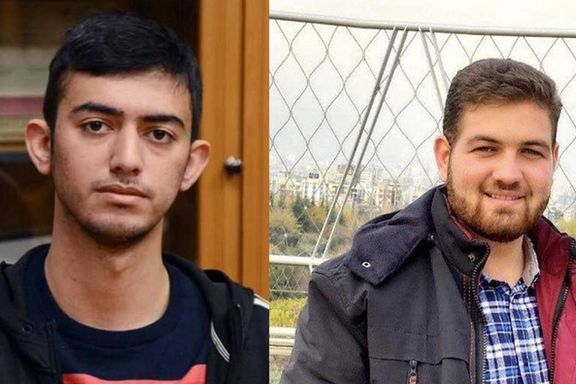
The second student of Tehran’s Amirkabir University suspiciously died this week due to alleged medical negligence.

The second student of Tehran’s Amirkabir University suspiciously died this week due to alleged medical negligence.
The telegram channel of the Amir Kabir University said Yusef Sevizi, a mining engineering master's student suffered a cardiac arrest on Wednesday in the dormitory while the university authorities did not provide medical service.
On Wednesday last week, another student named Basir Ebrahimpour suffered a cardiac arrest and died in the Abureihan building of the university.
According to the channel, the emergency department of the university caused the death of these two students within a week by "failing to send medical staff and taking care of them in time".
Mohammad Shahriari, Head of Tehran's Criminal Affairs Prosecutor's Office, said Sweizi's body was transferred to the forensics department claiming the cause of his death will be announced after "toxicology and pathology tests".
Farsi media has speculated that the two were poisoned, but so far, there has been no confirmation.
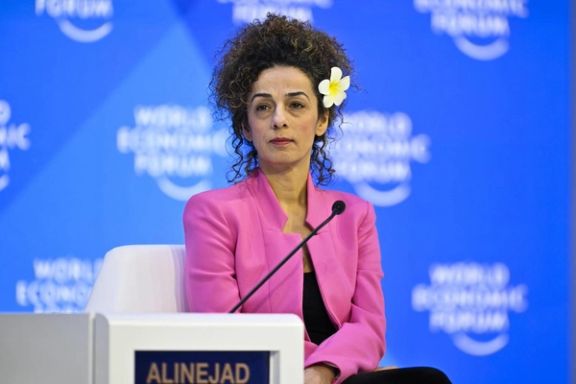
Masih Alinejad, a political activist, slammed the relocation of Iran International’s activities from the London office to Washington due to the UK’s inability to protect its citizens on its soil.
In an article in Time magazine, she urged the British government to take more measures to stop the IRGC and its terrorist activities around the world.
“The situation in the UK had already become so dire that Iran International—a Persian language media outlet which has invited the chagrin of the regime for daring to beam reliable news into Iran via satellite—was forced to flee the UK,” added Alinejad.
She went on to question how the UK, with one of the most sophisticated security apparatuses in the world, cannot even protect people on its own soil.
The authorities of the Islamic Republic have repeatedly threatened Iran International and its employees, significantly following the coverage of the Iranian people's uprising in recent months.
Alinejad, who has had multiple threats on her life from the IRGC and was recently under 24-hour police protection during a UK visit, said: “The UK has not even punished the Islamic Republic after its own citizens were maimed and killed. For instance, in July 2021 after the IRGC’s Aerospace Force attacked the Mercer Street commercial vessel killing two European nationals, including one British citizen, not even one sanction was levied on the Islamic Republic.”
The challenge facing Europe is not only about protecting its own citizens but also about standing up for the values of freedom, democracy, and human rights, underlined Alinejad.
She said by designating the IRGC as a terrorist organization, the UK prime minister can send a powerful message that he will not tolerate state-sponsored terrorism and will defend those who fight for justice and liberty.
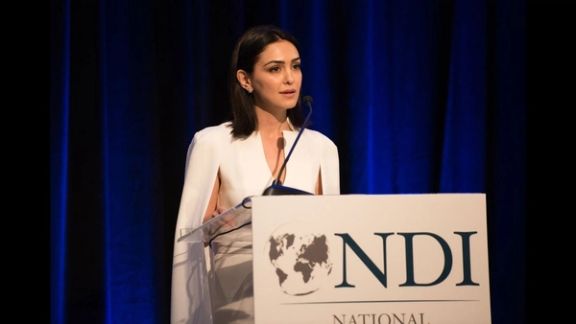
The Sydney Peace Prize for 2023 has been awarded to Iranian-born actress and political activist Nazanin Boniadi for her work advancing human rights in Iran.
Her work brought human rights in Iran into sharp focus after the death of Mahsa Amini last year, presenting the case to the UN Security Council, US Senate Human Rights Caucus, British Parliament, and a number of other forums around the world.
The Peace Prize jury said Boniadi was selected from a strong field of nominations “for drawing attention to human rights violations, for lending a powerful voice to support Iranian women and girls and their Woman Life Freedom movement, and for using a high-profile platform to promote freedom and justice in Iran.”
On accepting the Prize, Boniadi said: “Receiving the Sydney Peace Prize is an extraordinary honor. As my compatriots in Iran are subjected to unspeakable assaults on their minds, bodies and souls and risk their lives to speak out against the injustices they experience daily, I can only dedicate this recognition to them.”
The Sydney Peace Prize is Australia’s international prize for peace that recognizes leading global voices that promote peace, justice and nonviolence.
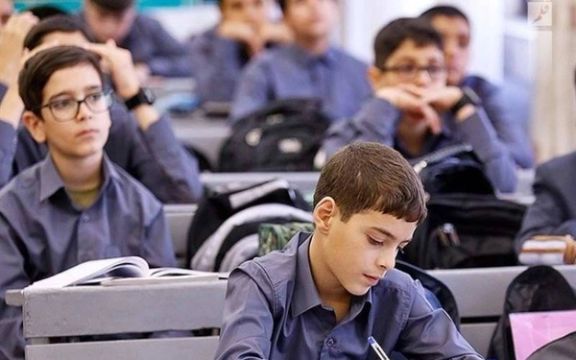
The emigration crisis in Iran has now reached school students who see no future for themselves in the country.
In a report on Wednesday, Etemad daily quoted a teacher as saying that the "students are disappointed."
According to her, the parents of a girl in year nine paid about $12,000 to enroll her in a school affiliated with a university in Toronto, Canada.
She said another reason for the migration of students is the law "urging them to pay thousands of dollars to release their bachelor's and master's degrees".
The government has stepped up pressures and restrictions on students and graduates. The health ministry in September increased the exit permit bond for medical, dental and pharmacy students to $5,000 per year.
Late in November, the parliament presented a proposal to ban students who participate in protests from traveling abroad for ten years. Recently, the Ministry of Science Research and Technology has also approved regulations that would increase the costs of receiving university degrees six to 10 times.
"Families say the amounts they will have to pay in the future to release the degrees, they can spend ... to send their children to study in other countries," said the teacher in the interview with Etemad.
The number of Iranians leaving the country has increased dramatically in recent years due to economic hardship and unemployment leaving a potential brain drain crisis looming.
However, the Iranian government, including the Ministry of Education, has not published any numbers on the migration of students abroad.
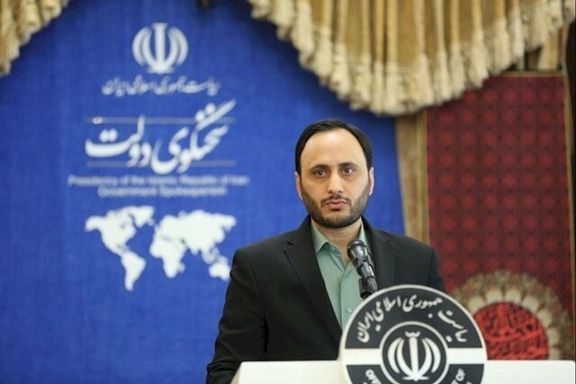
The regime spokesman has confirmed that authorities have access to unrestricted internet while the country faces blackouts.
Asked about the presence and activity of certain Iranian authorities and their children in social media platforms blocked for ordinary Iranians, Ali Bahadori Jahromi likened unrestricted internet access to assault weapons.
"The public don't have access to weapons, but the police have. Permissions are also issued for hunting weapons under certain conditions. The same applies to (social media) platforms, and this is what we see in most countries," Bahadori Jahromi told a gathering of Tehran University students on Tuesday.
He did not explain why the internet is restricted only in a few countries like the Islamic Republic and China, if "most countries" consider social media to be as dangerous as assault weapons.
While the public has very restricted access to the internet and social media platforms like WhatsApp, Instagram, Twitter, and Facebook, Iranian officials are able to have full access. The blockages have meant hundreds of thousands of Iranians are unable to work when already facing the worst economic crisis of recent history.
Documents leaked in January showed that Iran’s ministries of agriculture, communications, and industry had in separate letters requested to have access to unrestricted internet.
In one of those letters, an official at the agriculture ministry asked the communications ministry to provide "free, unfiltered and high-speed" internet to some people listed in the letter.
Since 2016, journalists close to the regime have unrestricted access to the Internet, while the government filtered more apps and websites during protests in recent months.
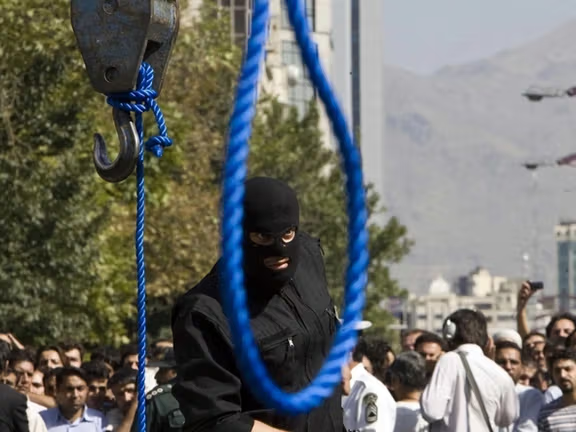
Twelve human rights organizations described the latest wave of executions in Iran as "alarming", calling for an immediate global response.
In a joint statement on Tuesday, they said:“These executions are deliberately designed to spread fear among the Iranian population and quash any form of dissent following the unprecedented nationwide protest movement that began eight months ago.
“Unless the international community takes robust action now, these executions will continue.”
The Abdorrahman Boroumand Center, Article 19, the Baloch Activists Campaign, Impact Iran, and Iran Human Rights are among the signatories against the chilling surge in executions by the Islamic Republic of Iran over the past few months, including the recent wave of executions targeting protesters.
As part of their calls for accountability, the rights organizations urged for targeted measures and restrictions against individuals and entities involved in these arbitrary deprivations of life.
“The recent executions in Iran demand an urgent and united response from the international community. We cannot stand idly by while scores of people are being executed, death row inmates and their families (who may themselves be persecuted for advocating on behalf of their loved ones) are waiting in terror, human rights are trampled upon, and justice is denied. The time for action is now,” read the statement.
At least 142 people were executed in Iran's prisons last month. This is the highest monthly figure since 2015.
Also, the number of executions in the first five months of 2023 has increased by 76% compared to the same period last year.